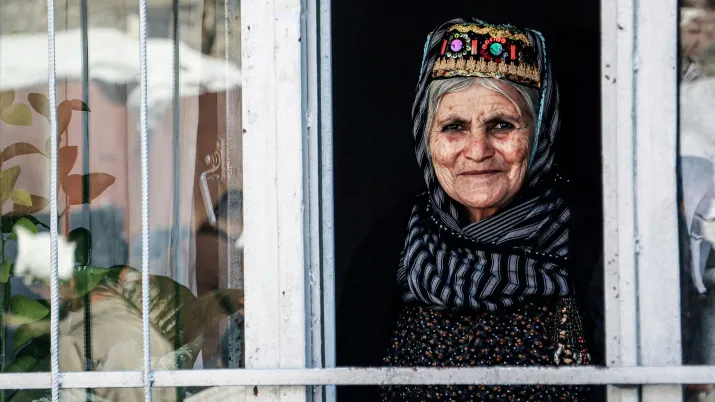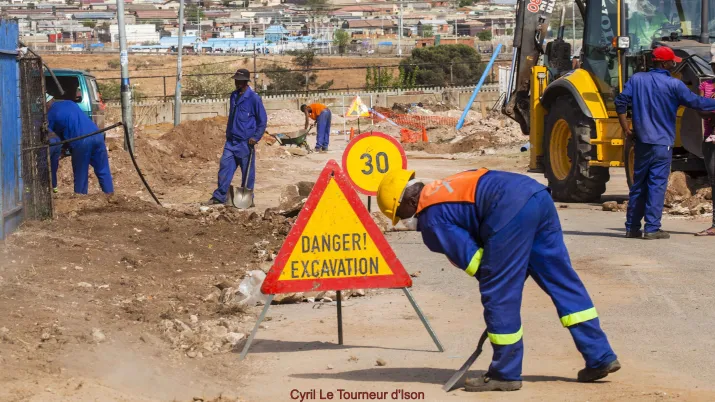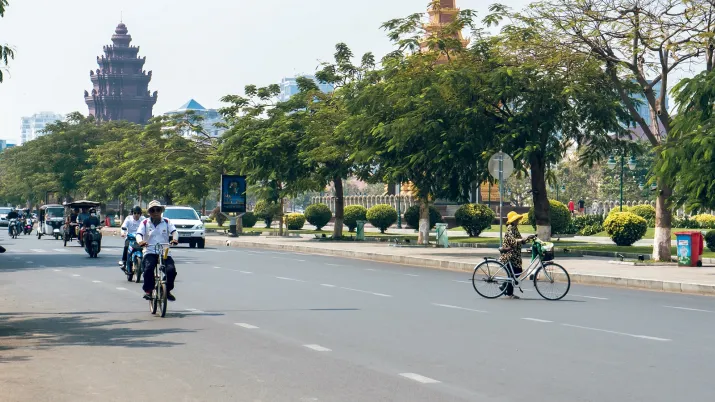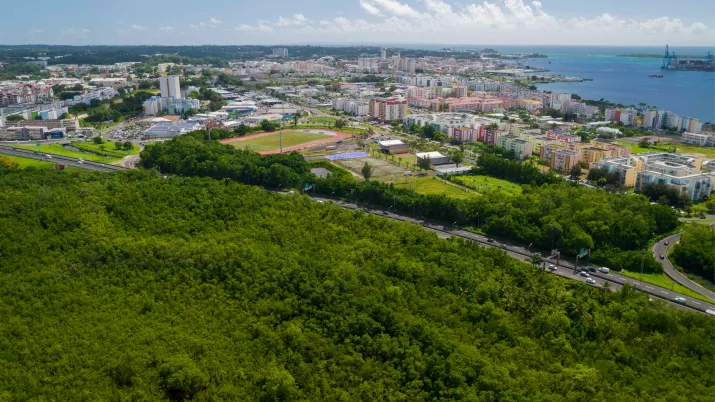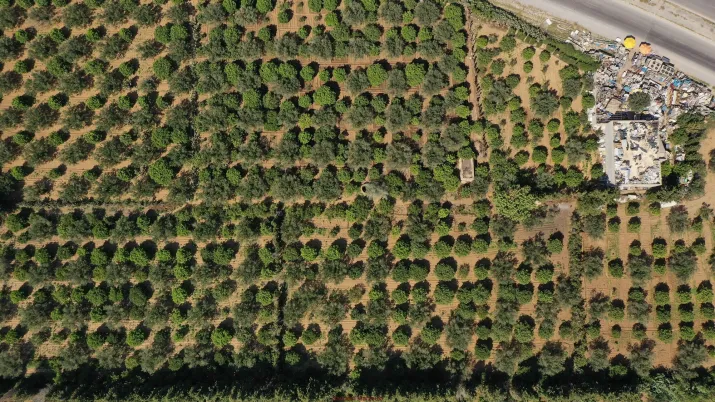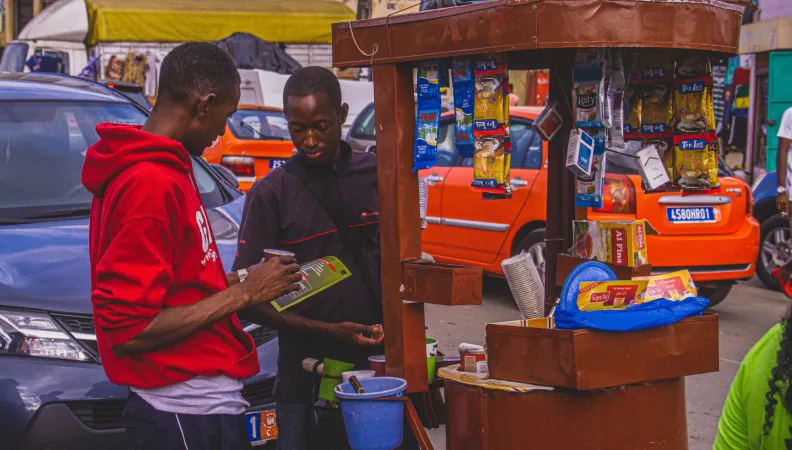 The integration of young people into the labour market is a challenge for Côte d'Ivoire, in a context of strong population growth. AFD is working with the Centre de recherche microéconomique du développement (CREMIDE) of Université Felix Houphouët-Boigny in Abidjan to conduct a skills assessment in four secondary cities in the country, and examine their adequacy with local job offers. The objective is to formulate recommendations regarding the integration of young people into the labour market and increase the attractiveness of these cities.
The integration of young people into the labour market is a challenge for Côte d'Ivoire, in a context of strong population growth. AFD is working with the Centre de recherche microéconomique du développement (CREMIDE) of Université Felix Houphouët-Boigny in Abidjan to conduct a skills assessment in four secondary cities in the country, and examine their adequacy with local job offers. The objective is to formulate recommendations regarding the integration of young people into the labour market and increase the attractiveness of these cities.
Context
The economic upturn in Côte d'Ivoire since the 2010s has had a limited impact on employment. The transition to employment is often difficult: 35% of 16-35 year olds are far from the labour market (neither employees, nor educated or in training). Moreover, the share of informal employment remains very high (89.4% in 2019). In this context, as a result of population growth, 300,000 young graduates join the job market every year – and an equivalent number leave the education system without a diploma, and without prospects. The mismatch between skills and job offers would be one of the explanations for the difficulties of integrating young people into the labour market.
If these young people carry economic and social development opportunities, they also carry risks if their potential is not used. Population growth makes it imperative to understand changes in labour supply and demand in order to adapt the education and learning system to the needs of the local labour market.
Goal
This research project aims to analyze the supply and demand of skills in Bouaké, Daloa, San-Pedro and Korhogo, four secondary cities in Côte d'Ivoire with strong economic potential but that is still little exploited. The city of Abidjan, on which the majority of studies on Côte d'Ivoire focus, is not specifically addressed by this research, but it remains the "reference" case for the analysis of the situations of secondary cities.
Deepening the results of a previous research project on the mismatch between skills and jobs in Côte d'Ivoire, this research project aims to enrich national knowledge on the functioning of the labour market and the nature of bottlenecks that make the transition to employment difficult for young people, as well as to make recommendations aimed at promoting employment and the attractiveness of the four cities.
Additionally, the project includes capacity-building activities specifically targeting young CREMIDE researchers, to support them in the development of their research and to encourage the establishment of scientific partnerships through their participation in international conferences, workshops and training seminars, and through residence in specialized research centres.
Method
The study will include an in-depth examination of the structure and composition (demography, training and skills) of the local workforce, and of spatial inequalities in skills supply and demand. A gender-specific assessment of the local skills supply will also be carried out, as well as a prospective analysis of the impact of technological developments on the labour market in these cities.
The data used will come from both employment surveys available since 1993 and field surveys conducted during this project. The analysis will incorporate a prospective aspect aimed at understanding jobs in Côte d'Ivoire by 2025 and 2030.
Knowledge will be shared with the research community and made available to national and local decision-makers through workshops, conferences and publications in adapted formats to inform public decision-making.
Discover other research projects
 Côte d'Ivoire is one of the 60 countries followed by AFD’s country-risk economists, whose assessments shed light on countries' economic trajectory and macroeconomic and financial situation.
Côte d'Ivoire is one of the 60 countries followed by AFD’s country-risk economists, whose assessments shed light on countries' economic trajectory and macroeconomic and financial situation.
Context
Côte d'Ivoire, the leading regional power in West Africa, aims to become an emerging country by 2020. To do this, it must reduce the poverty and inequality affecting its population and take all the necessary steps to promote youth employment. As a long-standing partner of Côte d'Ivoire, AFD supports it in carrying out key transitions for its future: demographic, social, energy, etc.
Goal
Produced by AFD's team of country-risk economists, country assessments provide an analysis of development processes in countries in which AFD operates. They also characterize their growth trajectory, and detect economic, social, political and financial vulnerabilities associated with these trajectories. AFD Group is thus in a position to properly measure the challenges and monitor the risks associated with each of its investments.
Emphasis is placed on developing countries, particularly in Africa, for which macroeconomic analyses are rare or infrequent. AFD seeks to complement existing production on the global economic situation, more focused on advanced economies and major emerging countries.
Find out more: Macroeconomic analyses at AFD
Method
Country-risk analysis is based on a close follow-up over a long period of time and rooted in a fine knowledge of local contexts. Cyclical trends, often highlighted in the news, are always examined in the light of structural trends and of the regional context in which they take place. The aim is to highlight country-specific macroeconomic issues while assessing risks against comparable time- and space-based trajectories.
Country-risk economists place the study of socio-political vulnerabilities, the growth model, the viability of public debt, external balances and the soundness of the financial system at the heart of their assessment, and give specific attention to countries' exposure to climate risks.
Lessons learned
Since emerging from its “lost decade” (2000-2010), Côte d'Ivoire has enjoyed strong economic growth (+7.2% since 2012). Resilient in the face of successive external shocks, it has confirmed its position within the WAEMU. A lower-middle-income country, it aspires to join the upper bracket by 2030. To achieve this, the economy, which is still largely based on commodity exports, faces a number of challenges, including restoring fiscal and external balance. Investment needs remain high to overcome persistent socio-economic fragilities and build an inclusive growth model. Despite good economic performance, the country remains vulnerable to political and security risks.
Our publications on Côte d'Ivoire's macroeconomic situation:
- "Côte d’Ivoire: Macro-financial resilience and pursuit of an emerging ambition" in MacroDev n°60 (February 2025)
- "Race towards emergence challenged by shocks" in MacroDev Semestrial Panorama n°53 (February 2024)
- "Côte d’Ivoire: a relatively resilient economy", in MacroDev Semestrial Panorama n°36 (September 2021)
- "Debt sustainability in Africa: state of play and future challenges", MacroDev n°34 (May 2021)
- "Les enjeux de la nouvelle croissance ivoirienne" (October 2015, in French)
Discover other research projects
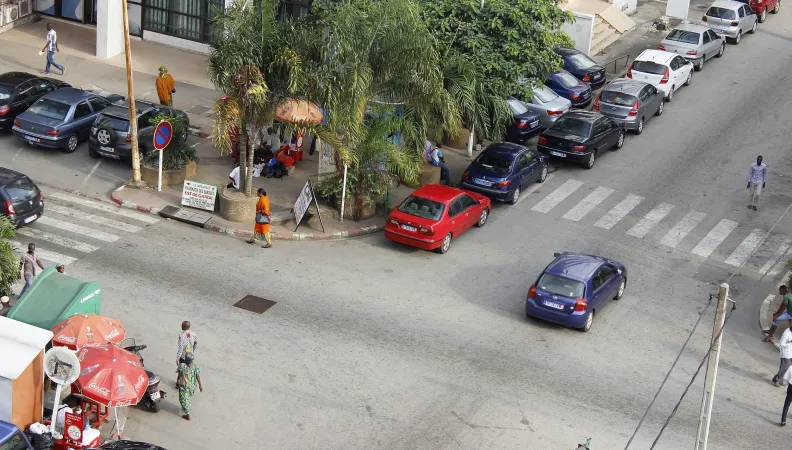 Côte d'Ivoire, whose current electricity production is largely based on natural gas, has affirmed its commitment in favor of the energy transition. The GEMMES Côte d'Ivoire project studies the interactions between the productive, financial and ecological spheres through macroeconomic modelling, thus constituting a real tool for Ivorian policy makers.
Côte d'Ivoire, whose current electricity production is largely based on natural gas, has affirmed its commitment in favor of the energy transition. The GEMMES Côte d'Ivoire project studies the interactions between the productive, financial and ecological spheres through macroeconomic modelling, thus constituting a real tool for Ivorian policy makers.
Context
Elaborating development policies in line with the principles of strong sustainability is a complex issue because of the tensions that may exist between different Sustainable Development Goals. The desire to integrate 42% of renewable energies in Côte d'Ivoire's energy mix by 2030 therefore requires a reflection on the possible sustainable development trajectories, a subject at the heart of the GEMMES Côte d'Ivoire project.
This project is part of AFD's modelling work, that integrates climate dynamics, both adaptation and mitigation, into macroeconomic forecasts to inform public policy choices in this area. AFD is developing a general theoretical model on the one hand, and national models applied to specific cases and adapted to the characteristics of each country (including the GEMMES Côte d'Ivoire model) on the other hand.
This collaboration between AFD, the Ministry of Planning and Development of Côte d'Ivoire and Mines ParisTech is one of the components of the memorandum of strategic dialogue, which aims to develop research activities, their dissemination, as well as their synergies with public policies.
Objectives
GEMMES Côte d'Ivoire's first goal is to better understand the interactions between the economy and socio-economical aspects. It focuses on the macroeconomic impacts of the energy transition and their ability to create favorable conditions for poverty reduction.
One of its specificities is that it aims to foster dialogue on the ecological transition between researchers and policy makers, both at national and international levels. GEMMES Côte d'Ivoire aspires to propose a tool to facilitate political decision-making, proposing transition trajectories in favor of climate. It could then provide elements contributing to the definition of an energy transition strategy for 2050 in line with Côte d'Ivoire’s poverty reduction and climate goals.
More broadly, GEMMES Côte d'Ivoire is helping to consolidate AFD’s position as a main stakeholder on low-carbon transition and strong sustainability.
Method
GEMMES Côte d'Ivoire develops a multidimensional and transdisciplinary approach focused on the effects of the energy transition. The project is based on modelling exercises:
- Techno-economical modelling of the energy system, developed by Mines Paris Tech
- Macroeconomic modelling, developed by AFD and the Ivorian think tank CAPEC
The methodological framework of GEMMES has been adapted to meet the characteristics of the Ivorian economy. A particular focus was placed on the stability of the trade balance and public debt. Moreover, the coupling between the energy model and the macroeconomic model allows to perceive the interactions between the dynamics of energy transition and macro-financial stability. In addition, coupling can highlight the benefits of an ambitious energy transition in terms of external sustainability and job creation.
Results
Three scenarios quantifying the long-term macroeconomic effects of the energy transition have been established. As a result, the development of renewable energy could reduce the average production cost by 20% under certain scenarios, notably through increased investment in the solar battery sector.
The development of this sector would also generate positive socio-economic impacts, concerning growth, employment and the trade balance, while increasing bioelectricity generation capacity improves the income of 4 million people in rural areas. This environment is then more favourable to the deployment of specific policies to fight poverty.
Research findings
The project has conducted the first GEMMES modelization exercise incorporated in the ongoing public policy dialogue between AFD and Ivorian public stakeholders. The project has provided the Ivorian government with models highlighting the opportunities and contradictions within the country's trajectory, between the possible energy choices, the environmental agreements to be considered and the financial implications of each scenario.
Want to stay updated on AFD’s latest research?
Contact
-
Antoine GODIN
Economist - Modeler


